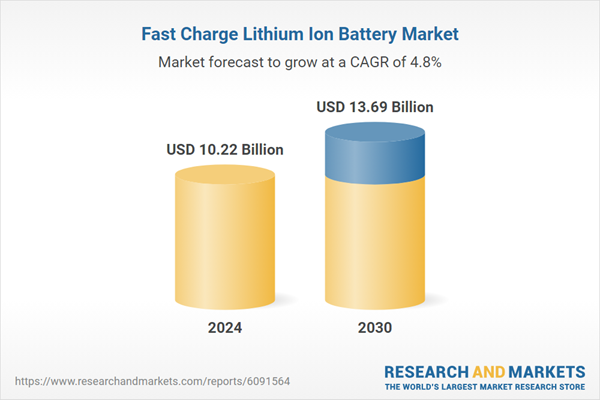Speak directly to the analyst to clarify any post sales queries you may have.
10% Free customizationThis report comes with 10% free customization, enabling you to add data that meets your specific business needs.
Key Market Drivers
Growing Demand for Electric Vehicles (EVs) and the Need for Rapid Charging Infrastructure
The accelerating global transition to electric mobility has significantly increased the need for fast charge lithium-ion batteries. As EV adoption surges, driven by environmental regulations, governmental incentives, and consumer demand for sustainable alternatives, the charging time of batteries remains a critical barrier to adoption. Conventional lithium-ion batteries often require extended charging periods, which can inconvenience users.Fast charge batteries address this limitation by enabling recharge times as short as 15-30 minutes, improving user experience and making EVs more comparable to gasoline-powered vehicles in terms of refueling convenience. Automakers like Tesla, GM, and Hyundai are incorporating these technologies into their EV platforms, backed by supportive regulatory frameworks and investments in high-speed charging networks. This alignment of battery innovation with expanding ultra-fast infrastructure is propelling demand and driving competition across the automotive and battery manufacturing landscape.
Key Market Challenges
Thermal Management and Safety Concerns
One of the foremost challenges in the fast charge lithium-ion battery market is managing the heat generated during rapid charging cycles. High-speed charging introduces substantial thermal stress on battery cells, increasing the risk of overheating and, in extreme cases, thermal runaway. This condition can lead to fire or explosion, posing serious safety concerns. Such stress accelerates material degradation, shortens battery lifespan, and compromises performance. These risks are particularly pronounced in electric vehicle battery packs, which contain large numbers of interconnected cells, making the impact of a single failure potentially systemic.Developing effective thermal management systems - such as liquid cooling and advanced battery management systems (BMS) - is essential but adds complexity and cost to battery designs. Furthermore, tightening safety regulations, coupled with shipping and transportation restrictions for high-density batteries, complicate global distribution and delay market entry for new products. These technical and regulatory hurdles continue to challenge scalability and consumer confidence.
Key Market Trends
Rising Demand for Electric Vehicles (EVs) Accelerating Innovation in Fast-Charging Capabilities
The growing global push for electric vehicles is reshaping innovation across the fast charge lithium-ion battery sector. Governments are increasingly offering incentives and implementing emissions targets to encourage EV adoption, prompting automakers to invest in reducing battery charging time. Advanced chemistries such as lithium-titanate (LTO) and lithium iron phosphate (LFP), along with breakthroughs in silicon anode materials, are significantly decreasing charging durations.Leading battery manufacturers - like Tesla, CATL, and StoreDot - are pioneering batteries capable of reaching 80% charge in less than 15 minutes, without compromising capacity or lifecycle. Additionally, strategic partnerships between battery and EV makers are advancing deployment of fast-charging infrastructure to support these innovations. The expansion of networks like Tesla Superchargers, IONITY, and Electrify America further complements this shift. As charging speed becomes a competitive differentiator, fast charge lithium-ion batteries are poised to become the standard across EV platforms, reinforcing their role as a central component in the evolution of electric transportation.
Key Market Players
- Toshiba Corporation
- Tesla, Inc.
- Samsung SDI Co., Ltd.
- Saft Batteries
- ProLogium Technology Co., Ltd
- Koninklijke Philips N.V.
- Panasonic Holdings Corporation
- Maxell, Ltd.
- LG Chem Ltd.
- Hitachi Energy Ltd.
Report Scope:
In this report, the Global Fast Charge Lithium Ion Battery Market has been segmented into the following categories, in addition to the industry trends which have also been detailed below:Fast Charge Lithium Ion Battery Market, By Type:
- 2C-Rate
- 3C-Rate
- 4C-Rate
- 6C-Rate
Fast Charge Lithium Ion Battery Market, By Application:
- Automobile
- Energy Storage
- Other
Fast Charge Lithium Ion Battery Market, By Region:
- North America
- United States
- Canada
- Mexico
- Europe
- France
- United Kingdom
- Italy
- Germany
- Spain
- Asia-Pacific
- China
- India
- Japan
- Australia
- South Korea
- South America
- Brazil
- Argentina
- Colombia
- Middle East & Africa
- South Africa
- Saudi Arabia
- UAE
- Kuwait
- Turkey
Competitive Landscape
Company Profiles: Detailed analysis of the major companies present in the Global Fast Charge Lithium Ion Battery Market.Available Customizations:
With the given market data, the publisher offers customizations according to a company's specific needs. The following customization options are available for the report.Company Information
- Detailed analysis and profiling of additional Market players (up to five).
This product will be delivered within 1-3 business days.
Table of Contents
Companies Mentioned
- Toshiba Corporation
- Tesla, Inc.
- Samsung SDI Co., Ltd.
- Saft Batteries
- ProLogium Technology Co., Ltd
- Koninklijke Philips N.V.
- Panasonic Holdings Corporation
- Maxell, Ltd.,
- LG Chem Ltd.,
- Hitachi Energy Ltd.
Table Information
| Report Attribute | Details |
|---|---|
| No. of Pages | 180 |
| Published | May 2025 |
| Forecast Period | 2024 - 2030 |
| Estimated Market Value ( USD | $ 10.22 Billion |
| Forecasted Market Value ( USD | $ 13.69 Billion |
| Compound Annual Growth Rate | 4.8% |
| Regions Covered | Global |
| No. of Companies Mentioned | 10 |









